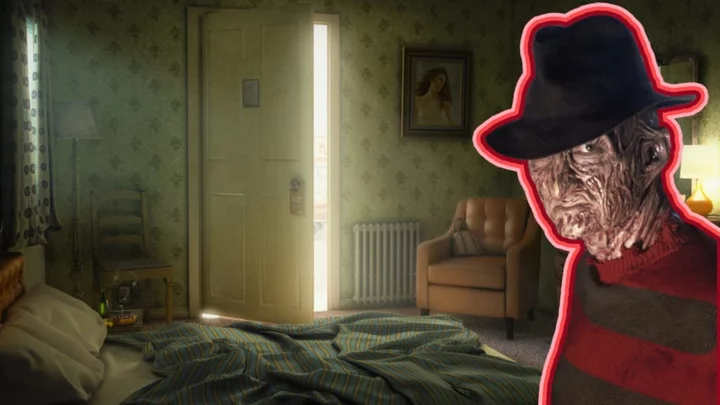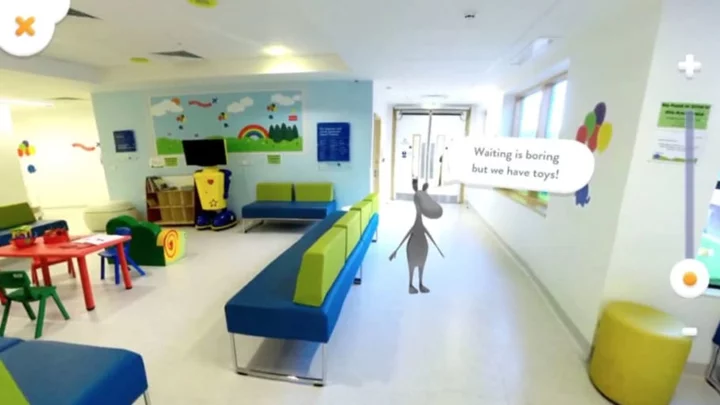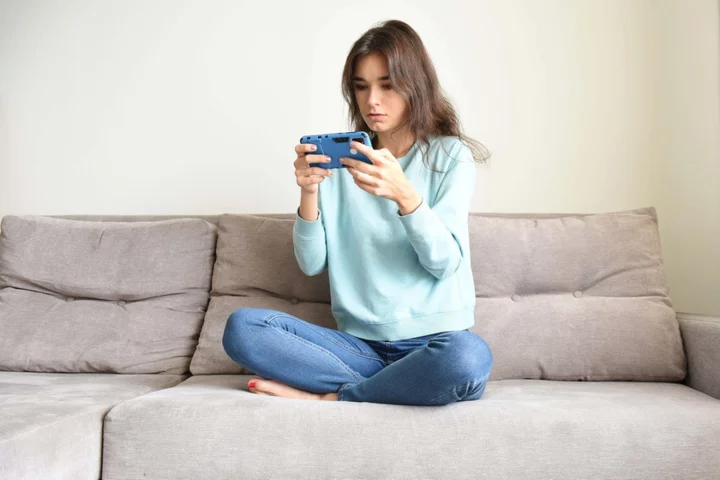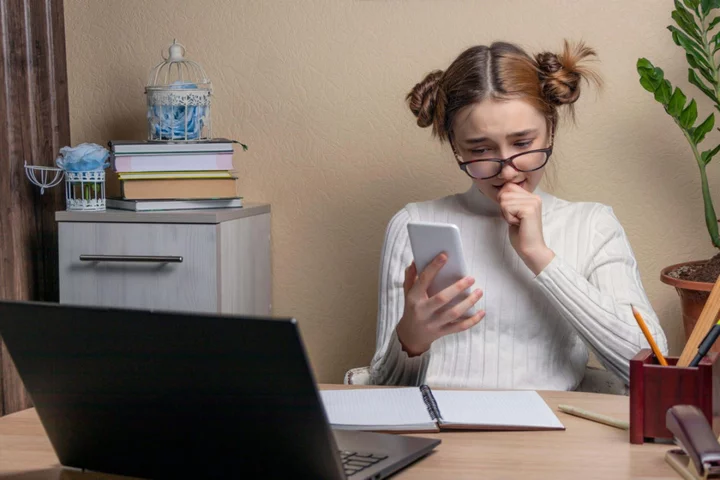
Amazing/Weird Period Board Game Teaches Kids About Menstruation
Move around the board with just a quick spin of the ovaries.
2023-10-23 21:23

‘Dogged by Death’: The True Story Behind the Bizarre Syndrome That Inspired ‘A Nightmare on Elm Street’
Here’s how a wave of mysterious deaths in the late 1970s and early 1980s among Southeast Asian refugees living in America inspired Wes Craven to pen his 1984 horror classic, “A Nightmare on Elm Street.”
2023-10-17 01:20

NY officials announce legislation aimed at protecting kids on social media
Two new bills meant to protect children's mental health online by changing the way they are served content on social media and by limiting companies' use of their data will be introduced in the New York state legislature, state and city leaders said Wednesday.
2023-10-12 03:57

Musk start-up Neuralink seeks people for brain-implant trial
The company hopes to help people with paralysis move a cursor, or type, using its brain implant.
2023-09-20 23:18

GE HealthCare gets $44 million grant to develop AI-assisted ultrasound tech
GE HealthCare Technologies Inc has received a grant of more than $44 million from the Bill & Melinda
2023-09-18 20:45

This Augmented-Reality App Makes the Hospital Experience Less Scary for Kids
Alder Play features videos, activities, and virtual rewards designed to shepherd kids through their hospital stay.
2023-09-11 21:20

YouTube begins verifying videos by UK doctors to tackle health misinformation
YouTube has launched a verification system for UK-based doctors, nurses, and other healthcare professionals to help Britons dodge medical misinformation online. UK-based users accounted for more than two billion video views of clips on health conditions in 2021. YouTube added a new seal of approval to accounts run by licensed doctors, nurses, psychologists, and other health practitioners or organisations who have passed stringent verification checks to fight misinformation. YouTube head of UK health Dr Vishaal Virani said the move to verified health videos for UK users was crucial due to the number of Brits accessing healthcare information through the video-sharing platform. Dr Virani told the BBC: “Whether we like it or not, whether we want it or not, whether the health industry is pushing for it or not, people are accessing health information online. We all know how difficult it can be to differentiate between healthcare information from trusted and reliable sources and content which is inaccurate or doubtful provenance Professor Dame Helen Stokes-Lampard “We need to do as good a job as possible to bring rigour to the content that they are subsequently consuming when they do start their care journey online.” The verification system began accepting applications from UK-based healthcare professionals to those with an active medical licence in June. Accounts that applied to the verification scheme are now starting to receive their YouTube mark of authenticity on their videos, to make it as easy as possible users to know if the information has come from a qualified healthcare professional. Potential health creators submitting their accounts have to go through a rigorous, multi-stepped verification process that works in partnership with the Academy of Medical Royal Colleges and the NHS. Health creators also have their past videos scrutinised and do not receive verification if previous videos uploaded to YouTube have contained any medical misinformation. Chairwoman of the Academy of Medical Royal Colleges Professor Dame Helen Stokes-Lampard said the partnership with YouTube had resulted in a positive solution for all. Dame Helen said in a statement: “We all know how difficult it can be to differentiate between healthcare information from trusted and reliable sources and content which is inaccurate or doubtful provenance. “I am pleased to say we have been able to draw on our own expertise and that of organisations from across the UK healthcare landscape to produce an easy-to-apply set of principles which will ultimately benefit everyone who turns to YouTube seeking trustworthy health information.” YouTuber and doctor Simi Adedeji has already received her YouTube tick of approval. But Dr Adedeji told the BBC that her videos, which primarily focus on skin health and women’s health, are not to be used in lieu of making an appointment with a medical professional for real-life advice. Dr Adedeji said: “There’s a difference between giving medical education, which is what we’re doing, and giving medical advice, which we don’t do. “It’s about giving medical information so that the audience feels empowered and can then go and see their doctor.” Read More Charity boss speaks out over ‘traumatic’ encounter with royal aide Ukraine war’s heaviest fight rages in east - follow live Should you swap your foundation for a lightweight skin tint? What should you do if you think your child is being bullied at school? What women should do if they experience violence online
2023-09-08 16:15

What women should do if they experience violence online
More than one in 10 women and girls in the UK’s four nations has been a victim of online violence, new research has found. Online violence can includes abuse, unwanted sexual remarks, trolling, threats, and non-consensual sharing of intimate messages and photos. The online YouGov survey, said to be the biggest so far into the issue, found 17% of the women and girls surveyed in Wales and Scotland have experienced online violence, as well as 15% in England and 12% in Northern Ireland. Researchers from the Open University said the findings show the problem is “widespread”. The data came from the 7,500 people aged 16 and over – 4,000 women and girls and 3,5000 men and boys – earlier this year. It also highlighted that online violence was higher among for those aged 16-24 (25%) and for LGBT+ women and girls (35%). The most commonly perceived reasons for why people commit such online violence were the anonymity provided by being online (49%), ease of getting away with it (47%) and misogyny (43%). So what can you do if you’re a victim of online violence? Trolling According to the Crown Prosecution Service, trolling is “a form of baiting online which involves sending abusive and hurtful comments across all social media platforms”. Trolls can be found everywhere on the internet, including forums, blogs, websites and social networks. “Don’t respond,” said Ruth Peters, solicitor and director at criminal defence firm Olliers Solicitors. “Trolls are looking for a reaction. Their aim is to upset and provoke you into making an angry/emotional response. Whilst you can’t prevent a troll from targeting you, you can decide how you choose to react. If you choose not to respond to the abuse, trolls generally give up and go away.” If you are being bullied online or receiving abusive comments, Dr Angela Wilcock, a senior lecturer in criminology at University of Sunderland thinks it’s important to tell a family member or a close friend, so you don’t feel alone and have can their support. The Online Safety Bill (which is expected to be passed at the end of this year) to protect women and girls is key, said Wilcock, “along with education from a young age. Women are continually having to risk assess and protect themselves, but we are not dealing with the perpetrators”. She added: “If women and girls do experience online violence, they must tell someone and seek help immediately from specialist services. To make themselves safer, they can also ensure social media privacy settings are activated.” Don’t forget to record, report and block trolls too. Peters noted. “If someone makes an offensive post, take a screenshot or print the post so that you have proof of it if necessary. “Ask the website moderator, administrator or owner to intervene if the troll doesn’t stop. Most websites/social network platforms have strong anti-abuse policies and, in most cases, trolls are guilty of violating their terms and conditions so will have their accounts terminated. “It’s OK to block those whose behaviour makes you feel uncomfortable and blocking someone on social media is easy.” Threats and abusive communication Set out under the Communications Act 2003 and the Malicious Communications Act 1988, malicious communications can include cyberbullying, harassment online or homophobic, racist, transphobic or misogynistic hate speech. Under section 127 of the Communications Act 2003, it is an offence for someone to send a message that is grossly offensive or indecent, obscene or menacing character. “The message does not need to actually reach the intended victim – the act of sending the message is sufficient,” Peters said. “A ‘message’ will cover all forms of messaging so this can mean a text, email, Facebook message, an internet forum, Snapchat message or picture, etc. Any image or message which has been sent electronically will be covered by this act.” Glitch, a UK charity aiming to end online abuse and championing digital citizenship, with a specific focus on black women and marginalised people, published its 2023 Digital Misogynoir Report in July. The findings “illuminate the ways misogynoir shows up in online spaces; the way it spreads and intersects with other forms of white supremacy; and, most disappointingly, how it is still missed in content moderation by tech platforms”, according to founder and CEO, Seyi Akiwowo, “Tech companies must take responsibility for the ways their ‘build first, think later’ approach actively harms black women – online and offline. “And while the pressure we’ve been applying to the UK government has resulted in the welcome and necessary addition of women and girls to the Online Safety Bill, the government has a responsibility to hold tech companies to consistent account for the violence their platforms enable.” Non-consensual sharing of intimate photos and messages In April 2015, the Criminal Justice and Courts Act (CJCA) 2015 made ‘revenge porn’ a specific offence, and it became a crime to “disclose private sexual photographs and films; without the permission of the individual who appears in the photograph or film; with intent to cause distress”, Peters said. “[But] stronger regulation is also proposed surrounding the sharing of sexual images without consent.” The Online Safety Bill, currently progressing through the House of Lords, seeks to specifially criminalise similar offences to revenge porn. “These include sharing ‘deepfakes’ (explicit images which have been altered to look like someone) without consent,” Peters said. “Stronger regulation is also proposed surrounding the sharing of sexual images without consent. The current law requires intention to cause distress in order to be found guilty of this offence, [but] the proposed changes will amend this in order to prosecute more people.” She added: “There will be a ‘base offence’ for sharing intimate images without consent. There will be two more serious offences created if images are shared to cause humiliation, alarm or distress, or for sexual gratification.” But for Wilcock, “women shouldn’t have to ensure our profiles are closed off to the world just so that we don’t endure abuse from trolls and abusers. “It shouldn’t be this way, but that is the sad reality of today’s online world. Until we do more to hold perpetrators to account and deal with them appropriately, it is hard to see how it will get better for victims.” Read More Charity boss speaks out over ‘traumatic’ encounter with royal aide Ukraine war’s heaviest fight rages in east - follow live Athlete who ran over 200km through the desert shares advice for running in a heatwave Women being invited to help shape the future of reproductive healthcare – from period pain to menopause How to style your home like a professional
2023-09-07 22:27

EU safety laws start to bite for TikTok, Instagram and others
Nineteen large platforms have to start complying with new rules as soon as Friday or risk big fines.
2023-08-25 07:16

How to help your teen with comparison culture on GCSE results day
Whether your child’s GCSE results are high, low, or somewhere in between, one thing is inevitable – they’ll compare them with their friends’ grades. This comparison culture, which is far more pervasive because of social media, can leave teens feeling inadequate because their results are worse than their mates, or make their friends feel useless if roles are reversed. But although there’s no getting away from teenagers comparing their results both on and offline, what can parents do to try and limit the damage this it can cause? Former teacher Dr Julia Clements, principal educational psychologist at the children’s mental health charity Place2Be, says the comparison of results will undoubtedly impact some teenagers’ wellbeing. “Your teenager is bound to compare their results with their peers at the same school, but also through social media,” she acknowledges. “Although this comparison is inevitable, it may be harmful for your child’s wellbeing – especially if they’ve not done as well as expected. “Indeed, the term ‘compare and despair’ can be especially pertinent on days like today.” Sharon Davies, CEO of Young Enterprise, a charity which helps young people navigate the changing world of work, adds: “The pressure to measure up to their friends’ achievements can be overwhelming, leading to feelings of inadequacy or disappointment.” So how can parents help their teens? 1. Ask how they feel If your child is down on themselves and rating themselves negatively in comparison to their friends, they may reject any positives and praise parents provide, Clements warns. “It may be more useful, in the first instance, to ask them how they’re feeling, and to acknowledge and validate difficult feelings,” she advises. Such feelings may include disappointment, sadness, anger, shame, or feeling as if they’ve let themselves – and you – down. “If your child is feeling like this, it’s important to give them the message that you love them unconditionally and you’re proud and pleased to be their parent because of who they are – not because of the grades they achieve,” she stresses. 2. If they’ve done better than their friends… If your child has achieved good results, which may be better than some of their friends, then they’ll want to celebrate. But while celebrating is of course a great idea, Clements suggests: “You may want to talk with them about how to be sensitive and compassionate towards their friends who haven’t done so well.” 3. Help them turn a negative into a positive Consultant clinical psychologist Dr Nihara Krause specialises in teenage mental health and is working with the Talking Futures campaign to help parents engage their children in meaningful conversations about their futures. She says if a young person doesn’t get the grades they were hoping for, they may be highly critical of their performance in comparison to their peers. But she suggests parents show them how to turn their negative thinking around. “Parents should encourage their children to focus on recognising the approach they took to exams this time round and take steps to reflect on what they could do to achieve a better result in the future. Focus on what helps a young person gain their own personal best, no matter how their results compare with others.” 4. Don’t ask about their friend’s results or post about them Krause says parents should try to celebrate their child’s achievements for what they are and avoid asking about their friends’ results. “To avoid comparison, parents should also avoid sharing their child’s results on social media,” she says. 5. Don’t be too hard on yourself Clements points out that comparison culture may not just affect teenagers – if their results aren’t as good as expected, mums and dads might start comparing their own parenting during the revision and exam period with other parents whose kids have got better results. “As a parent or carer, you may also be drawn into unhelpful comparisons with others,” says Clements, “and you may question the amount of support you were able to provide your child in the run up to their exams. However, today is not a day for self-criticism or judgements – some self-compassion is important at this time.” 6. Reach out for support This might be the first results day many parents have gone through with their child, and while comparisons with other teens may well have been unhelpful, Davies points out that schools will have career advisers and teachers available who can offer support and advice. There are also online forums and blogs where those in similar situations share their experiences. She says: “No-one is expecting you to have all the answers – that’s why there’s support available.” Read More Charity boss speaks out over ‘traumatic’ encounter with royal aide Ukraine war’s heaviest fight rages in east - follow live Women more severely affected by ME, study claims 4 hacks to get teens off the sofa and get active – as study warns of heart damage Taking adult education classes may lower risk of dementia, study suggests
2023-08-24 13:47

Parents of nine-year-old high school graduate reveal their number one parenting tip
David Balogun is a normal kid who competes in paper airplane races with his younger sister, Eliana and struggles to sit still, but he is also one of the youngest people in the United States to receive a high school diploma. In late January, Balogun graduated from Reach Cyber Charter School, which is a tuition-free online school in Pennsylvania. This month he will be starting classes at Southern New Hampshire University as a full-time student. Balogun and his parents, Ronya and Henry, spoke about what it was, and still is, like raising someone with a high intellect on CNBC Make It. The couple said they first tested their son’s intelligence when he was six years old. After that, they began to rethink any parenting philosophies they previously had. “There’s no book on it,” Ronya said. “You’ve got to develop a different mindset as a parent,” Henry added. “It’s not always easy when your son is asking you questions constantly. You have to keep answering the questions, because you don’t want to say, ‘Just leave me alone.’” Because of David’s unique circumstances, they’ve developed their own number one rule: When a system isn’t built for your child, don’t try to fix your child. Try to fix the system. Ronya said when David was in first grade, a regular classroom wasn’t working anymore, noting that sometimes his peers would listen to him more than the teacher. So they looked into their state’s gifted programs, which also proved to not be rigorous enough for their nine year old. In 2020, his parents enrolled him in Reach which allowed him to individualise his curriculum and take high school level classes. Although that didn’t come without challenges, including multiple calls to The College Board because David’s birthdate was too young to enroll in advanced placement exams. As for deciding on college, Ronya said she had to put her foot down mentioning she didn’t want David in a class filled with 20 year olds. “It’s a different adaptation that we don’t have in the United States of America yet. It’s very scary, you can’t find this,” she said. “Sometimes I can’t fix the system, but there are other unconventional choices and solutions to help lead my son through his journey to fulfill his dreams.” Trust is also a big part in parenting David, his parents said. They mentioned that, when he was learning specific skills like adding and subtracting negative numbers before he was taught, they had to believe he knew how. “I can’t tell him, ‘This is what you know,’ because I’m not in his brain,” Ronya said. “I have to trust him to be partially leading the way.” Although there are some boundaries in this trust, as David came home one day claiming he now knew where babies came from. His mother was able to briefly give him some information on reproductive anatomy before putting the conversation to a stop. “Mind you, at this moment, I’m talking to a six year old,” Ronya said. In terms of what happens to David beyond college, his parents are unsure and are just figuring it out as they go along. “There is no frame of reference,” Ronya said. “So you know how sometimes when there is no path, you start a new path? Yep, that’s what we’re doing.” The Independent has contacted Ronya and Henry for comment. Read More TikToker urges parents to save old clothes for their children after inheriting mother’s wardrobe Mother criticises ‘double standard’ after husband is praised for taking toddlers to grocery store Mother sparks viral debate for ‘shaming’ parent who refused to give her daughter a slice of cake TikToker urges parents to save all their old clothes for children to inherit Gen X mother goes viral for attack on ‘tired’ American Dream Couple discovers why their child thought ‘mums foam at the mouth while having babies’
2023-08-16 05:52

Meta criticized for making reproductive health an R-rated issue
Female reproductive health experts are calling on Meta, the parent company of Facebook and Instagram, to rethink its restrictions on reproductive health content.
2023-08-15 23:47
